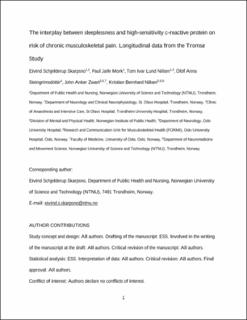The interplay between sleeplessness and high-sensitivity C-reactive protein on risk of chronic musculoskeletal pain: longitudinal data from the Tromsø Study
Skarpsno, Eivind S.; Mork, Paul Jarle; Nilsen, Tom Ivar Lund; Steingrímsdóttir, Ólöf Anna; Zwart, John Anker; Nilsen, Kristian Bernhard
Peer reviewed, Journal article
Accepted version

Date
2019Metadata
Show full item recordCollections
- Artikler [5061]
- Publikasjoner fra CRIStin FHI [7531]
Abstract
Study Objectives To examine independent associations of sleeplessness and high-sensitivity C-reactive protein (hsCRP) with risk of chronic musculoskeletal pain, and to explore the joint effect of sleeplessness and hsCRP on risk of chronic musculoskeletal pain. Methods A population-based prospective study of 3214 women and 3142 men (mean age: 55.4, range: 32–87) without severe chronic musculoskeletal pain and with hsCRP ≤ 10 mg/L at baseline in 2007–2008. Modified Poisson regression was used to calculate adjusted risk ratios (RRs) with 95% confidence intervals (CIs) for any chronic musculoskeletal pain and chronic widespread pain (CWP) at follow-up in 2015–2016 associated with self-reported sleeplessness and hsCRP at baseline. Results Compared with persons without sleeplessness, women and men reporting often/or always sleeplessness had RRs of CWP of 2.53 (95% CI: 1.94–3.29) and 2.48 (95% CI: 1.63–3.77), respectively. There was no clear association between hsCRP and risk of any chronic musculoskeletal pain or CWP. Joint effect analyses using persons without sleeplessness and with a hsCRP < 1.00 mg/L as the reference gave RRs for chronic musculoskeletal pain of 1.73 (95% CI: 1.26–2.37) for those with often/always sleeplessness and hsCRP < 1.00 mg/L; 1.01 (95% CI: 0.78–1.32) for those without sleeplessness and hsCRP ≥3.00 mg/L; and 2.47 (95% CI: 1.79–3.40) if they had both often/always sleeplessness and hsCRP ≥ 3.00 mg/L. The corresponding RRs for CWP were 1.89 (95% CI: 1.27–2.83), 0.96 (95% CI: 0.68–1.37), and 2.83 (95% CI: 1.91–4.20), respectively. Conclusions These results suggest that there is an interplay between sleeplessness and hsCRP on risk of any chronic musculoskeletal pain and CWP.